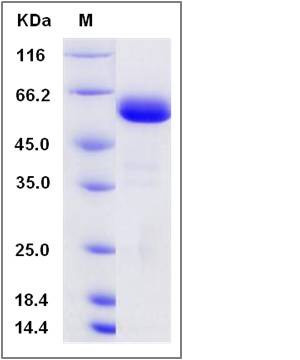Rat JAM-A / F11R Protein (Fc Tag)
F11R, Jam1
- 100ug (NPP2850) Please inquiry
| Catalog Number | P80240-R02H |
|---|---|
| Organism Species | Rat |
| Host | Human Cells |
| Synonyms | F11R, Jam1 |
| Molecular Weight | The recombinant rat F11R/Fc is a disulfide-linked homodimer. The reduced monomer comprises 453 amino acids and has a predicted molecular mass of 49.9 kDa. The apparent molecular mass of the protein is approximately 60 kDa in SDS-PAGE under reducing conditions. |
| predicted N | Lys 27 |
| SDS-PAGE |  |
| Purity | > 96 % as determined by SDS-PAGE |
| Protein Construction | A DNA sequence encoding the rat F11R () was expressed, fused with the Fc region of human IgG1 at the C-terminus. |
| Bio-activity | |
| Research Area | Cardiovascular |Blood |Platelet |
| Formulation | Lyophilized from sterile PBS, pH 7.4 1. Normally 5 % - 8 % trehalose, mannitol and 0.01% Tween80 are added as protectants before lyophilization. Specific concentrations are included in the hardcopy of COA. |
| Background | Junctional adhesion molecule-A (JAM-A), also known as F11 receptor (F11R) or Cluster of Differentiation 321 (CD321), is a transmembrane protein expressed at tight junctions of epithelial and endothelial cells, as well as on circulating leukocytes. JAM-A protein serves as a serotype-independent receptor for mammalian orthoreoviruses (reoviruses). It is also a ligand for the integrin LFA1, involves in leukocyte transmigration. As a cell adhesion molecule of the immunoglobulin superfamily, JAM-A protein involves in platelet adhesion, secretion and aggregation, and plays a crucial role in inflammatory thrombosis and atherosclerosis. In addition, it may be a potential therapeutic target for breast cancer. |
| Reference |
